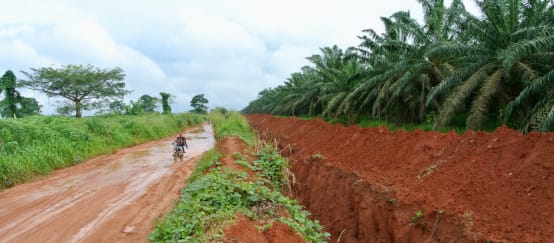Stop Nigeria's lawless palm oil juggernaut!
 A forest elephant and calf, Cross River, Nigeria (© Thomas Breuer / Mbeli Bai Study – WCS)
A forest elephant and calf, Cross River, Nigeria (© Thomas Breuer / Mbeli Bai Study – WCS)
Palm oil production in Nigeria is a destructive and violent business. Companies like Okomu Oil Palm Plantation Plc (OOPC) are clearing forests with breathtaking speed and leaving destroyed livelihoods and human rights violations in their wake. Please support the struggle of local communities for their rights and for nature.
News and updates Call to actionTo: the President of the Federal Republic of Nigeria, Bola Ahmed Tinubu; Governor Godwin Obaseki
“OOPC is destroying Nigeria’s remaining forests, as well as grabbing the land and violating the rights of thousands. Please protect nature and local communities.”
On May 20, 2020, the village Ijaw-Gbene in southern Nigeria was burnt to the ground. Witnesses identified the Okomu Oil Palm Plantation Plc (OOPC) security force and members of the Nigerian army as the attackers. Previously, three other villages had been torched under similar circumstances.
The attack in May 2020 left local farmers and fisherfolk homeless and their properties destroyed. More than 80 villagers had no choice but to seek shelter in neighboring communities and in churches, rendering social distancing impossible and increasing their risk of COVID infection.
OOPC is a subsidiary of SOCFIN, a group controlled by French corporate titan Vincent Bolloré and the Belgian businessman Hubert Fabri. SOCFIN operates rubber and palm oil plantations in ten countries in Africa and Asia. The group has a less than stellar reputation: In Cameroon, Liberia, Sierra Leone, Ivory Coast and Cambodia, local people complain about ruthless methods wherever its subsidiaries are active.
In Nigeria’s Okomu Kingdom, SOCFIN’s 33,000-hectare plantation is encroaching on communities that never agreed to give their ancestral land away. It stretches into forest reserves, home to endangered species such as chimpanzees, forest elephants and red-bellied monkeys. Logging and industrial agriculture are the major drivers of deforestation in Nigeria, a country that has already lost 96 percent of its forest cover.
In a joint letter dated September 4, local communities asked the Nigerian president to take steps against OOPC. The struggle against the company is not an isolated case – it’s symptomatic for the palm oil business around the world.
Please support the affected communities in fighting for their rights and for the forests with your signature.
BackgroundThe people affected by Okomu Oil Palm Plantation (OOPC) sent the following letter to Nigeria’s president Muhammadu Buhari and Edo state’s governor Godwin Obaseki:
Your Excellency,
President Muhammadu Buhari
President and Commander in Chief of the Armed Forces Federal Republic of Nigeria
Government House, Aso Rock
Abuja, Nigeria.
Re: SOCFIN and her subsidiary Okomu Oil Palm Company Plc rights violations in Edo State Communities/Villages: An S.O.S.
Dear Sir,
The Okomu Oil Palm Company Plc was established in 1976 as a federal government project and was privatized in 1979. Now, the SOCFIN Group is the majority owner.
The activities of the company over the years have been characterized by violations of citizens’ rights. Some of the violation accusations against Okomu Oil Palm Company Plc range from locking out citizens of their host communities from the entrance to their communities to harassment of outspoken indigenes of their host communities with security agencies, circumvention of the global principles of free, prior and informed consent, land grabbing, destruction of citizens’ livelihoods, use of brute force and military might to dislodge, dislocate and disperse villages and settlements within their areas of operation. In all of these, citizens’ fundamental rights are thrown overboard. In years past, Okomu Oil Palm Company Plc security forces in collaboration with men of the Nigerian Army have burnt down and dispersed villagers of Agbede, Oweike, Lehmon and recently on the 20th day of May, 2020 the village of Ijaw-Gbene on flimsy excuses and at this time of corona virus pandemic. We understand that the company may claim to be contributing to the Edo State Government's internally generated revenue, but at what expense? We cannot continue to accept a practice of profit above humans syndrome that has been typical of the operations of Okomu Oil Palm Company Plc/SOCFIN groups in Nigeria and Africa. Business must respect human rights and where these are in danger, the government must protect her citizens and remedy must be provided for victims, after all, Nigeria not only supported but also promoted the promulgation of the United Nations Guiding Principles on Business and Human Rights, and Okomu Oil Palm Company Plc should not be allowed to continue to act with impunity!
A report published in 2017 (1) shows how the company encroached on forest reserves and customary lands without consent or adequate compensation to the impacted communities. This land grabbing and forest destruction has put the livelihoods of over 60,000 forest-dependent people on the edge, increasing hunger and social conflicts. The report exemplifies both human rights violations as well as biodiversity destruction and water pollution. The report also analyses breaches of the Forestry Laws of Nigeria, among others, and occupation of part of the land illegally by the company.
Your Excellency Sir, based on the above, we humbly make the following requests:
1. A holistic and independent investigation into the acquisition of the large acres of the reserved and other community lands by Okomu Oil Palm Company Plc.
2. An investigation into the use of military and their security forces to destroy their host villages, especially the recent one that occurred on the 20th May 2020.
3. That the company be directed to stop forthwith any form of attacks on their host villages/communities but should treat them as equal stakeholders and immediately unlock the gates that are the entrance and exit routes for communities liaising with them on how to secure the access routes.
4. That the perpetrators who burnt down Agbede, Oweike, Lehmon and Ijaw-Gbene should be fished out and brought to book and adequate compensations/damages paid to the victims of those violent destructions.
5. That in the interim, you use your good offices to direct the provision of relief materials for the people of Ijaw-Gbene who are the most recent victims in terms of food, clothes, utensils and shelter.
6. In the long term, the Government should thoroughly investigate the disrespect of the law by the Okomu Oil Palm Company Plc. especially as it relates to lack of due process in the acquisition of some of the lands where they have their plantations and where found culpable, the company should be compelled to leave the illegally occupied land with other deterrent and punitive sanctions imposed.
7. The Government should ensure that Okomu Oil Palm Company Plc stop forthwith their destruction, pay compensation for the destructions and losses caused to the communities as well as general and exemplary damages for the biodiversity destruction.
It is our further humble request Your Excellency that:
- Before any further development of oil palm or rubber production, a negotiation, survey, documentation and a genuine environmental and social impact assessment must be immediately carried out on the entire land occupied by Okomu Oil Palm Company Plc. A failure to do so and to abide by the new terms should earn the company a status of an illegal occupier.
- Free, Prior, and Informed Consent (FPIC) is an internationally enforceable right, therefore Okomu Oil Palm Company Plc should go back to status quo ante to right the wrongs against Okomu communities or vacate the area totally.
- Okomu Oil Palm Company Plc must urgently rebuild and reinstate the four communities forcefully evicted, restore the environment and properties extirpated and pay compensation for the farms and crops destroyed in all their communities and villages impacted by their operations.
- Okomu Oil Palm Company Plc should conduct a medical check and treatment for the people of Okomu communities as a result of the pollution of the creek due to the agrochemicals used for the development of their palms and rubbers.
- Okomu Oil Palm Company Plc must as a matter of urgency return the boats, fishing traps and hooks seized from the 35 women for their sustainable economic livelihood and pay compensation immediately.
- That henceforth promises made by the company in the area of health, education, road and employment must be fulfilled and a yearly cooperate social responsibilities must be agreed on with a time frame attached via a well-documented Memorandum of Understanding (MoU).
- Failure to comply with the above, Okomu Oil Palm Company Plc must be held responsible for any breakdown of law and order that might arise as a result of the non-compliance.
Your Excellency sir, we are available, willing and ready to provide further information and evidence where needed as we await your fatherly favourable response to our above humble requests.
Yours faithfully,
…………………………………………………………...
1 Uwaka, Rita, Chlma Williams and Nosa Tokunbor (2017): Deforestation, Land Grabbing in Edo State - Impacts of Okomu Oil Palm Plc operations on Community Land's and the Environment", published by Environmental Rights Action / Friends of the Earth Nigeria
To: the President of the Federal Republic of Nigeria, Bola Ahmed Tinubu; Governor Godwin Obaseki
Dear President Bola Ahmed Tinubu,
Dear Governor Godwin Obaseki,
On May 20, 2020, the village Ijaw-Gbene in Okomu Kingdom was burnt down. Witnesses clearly identified security forces of Okomu Oil Palm Plantation Plc (OOPC) as the attackers, together with members of the Nigerian army.
The company denies the allegations.
The attack left local farmers and fisherfolk homeless and their properties destroyed. More than 80 persons who were living in the village had no choice but to take shelter in neighboring communities and in churches, rendering social distancing impossible and increasing their risk of COVID infection.
In a joint letter dated September 4, the affected communities asked you to take steps against OOPC. We support their demands and urge you to
- ensure that OOPC stops attacking villages and respects the people’s human rights;
- ensure that OOPC stops the destruction of nature;
- thoroughly investigate the alleged violations of the law by OOPC; where found culpable, the company must be compelled to leave the illegally occupied land with deterrent and punitive sanctions imposed;
- ensure that OOPC stops forthwith their destruction and compensates the affected communities for the losses inflicted on them, as well as general and exemplary damages for the destruction of biodiversity.
Yours faithfully,
The issue – rainforest on our dinner tables and in our fuel tanks
At 66 million tons annually, palm oil is the most commonly produced vegetable oil. Its low world market price and properties that lend themselves to processed foods have led the food industry to use it in half of all supermarket products. Palm oil can be found in frozen pizzas, biscuits and margarine, as well as body creams, soaps, makeup, candles and detergents.
Few people realize that almost half of the palm oil imported into the EU is used as biofuel. Since 2009, the mandatory blending of biofuels into motor vehicle fuels has been a major cause of deforestation.
Oil palm plantations currently cover more than 27 million hectares of the Earth’s surface. Forests and human settlements have been destroyed and replaced by “green deserts” containing virtually no biodiversity on an area the size of New Zealand.
The impact – suffering and death in producer countries, climate havoc
The warm, humid climate of the tropics offers perfect growth conditions for oil palms. Day after day, huge tracts of rainforest in Southeast Asia, Latin America and Africa are being bulldozed or torched to make room for more plantations, releasing vast amounts of carbon into the atmosphere. As a consequence, Indonesia – the world’s largest producer of palm oil – temporarily surpassed the United States in terms of greenhouse gas emissions in 2015. With their CO2 and methane emissions, palm oil-based biofuels actually have three times the climate impact of traditional fossil fuels.
Palm oil is not only bad for the climate: As their forest habitat is cleared, endangered species such as the orangutan, Borneo elephant and Sumatran tiger are being pushed closer to extinction. Smallholders and indigenous people who have inhabited and protected the forest for generations are often brutally driven from their land. In Indonesia, more than 700 land conflicts are related to the palm oil industry. Human rights violations are everyday occurrences, even on supposedly “sustainable” and “organic” plantations.
As consumers, we are largely unaware of these broader issues, yet our daily palm oil consumption also impacts our health: refined palm oil contains large amounts of harmful fatty acid esters that are known to damage DNA and cause cancer.
The solution – a revolution on our dinner tables and in our fuel tanks
Only 70,000 orangutans still roam the forests of Southeast Asia, yet the EU’s biofuels policy is pushing them to the brink of extinction. Every new plantation on Borneo is destroying a further piece of their habitat. Stepping up the pressure on policymakers is a must if we want to save our tree-dwelling kin. Apart from that, however, there is still a lot we can do in day-to-day life.
Follow these simple tips to recognize, avoid and combat palm oil:
- Enjoy a home-cooked meal: Use your imagination: why not try almond-coconut-pear biscuits? Or pizza with potato and rosemary? A meal cooked from fresh ingredients beats processed foods containing palm oil every time. Oils such as sunflower, olive, rapeseed or flaxseed are ideal for cooking and baking.
- Read labels: As of December 2014, labeling regulations in the EU require food products to clearly indicate that they contain palm oil. However, in the case of non-food items such as cosmetics and cleaning products, a wide range of chemical names may still be used to hide the use of palm oil. A quick check of your favorite search engine will turn up palm oil-free alternatives, however.
- Remember that the customer is king: Ask your retailers for palm oil-free products. Write product manufacturers and ask them why they aren’t using domestic oils. Companies can be quite sensitive to issues that give their products a bad name, so inquiring with sales staff and contacting manufacturers can make a real difference. Public pressure and increased awareness of the problem have already prompted some producers to stop using palm oil.
- Sign petitions and write your elected representatives: Online campaigns put pressure on policymakers responsible for biofuels and palm oil imports. Have you already signed all of Rainforest Rescue’s petitions?
- Speak out: Protest marches and creative action on the street raise public and media awareness of the issue, which in turn steps up the pressure on policymakers.
- Leave your car at home: Whenever you can, walk, ride a bicycle or use public transport.
- Be informed and inform others: Big Business and governments would like us to believe that biofuels are good for the climate and that oil palm plantations are sustainable. Spread the word – share this information with your family and friends and encourage them to rethink their consumption habits. It’s in our hands!
Nigeria: Villages once again being torched for palm oil

Peace remains elusive for people living near Okomu’s oil palm plantations: On September 2nd, security forces looted and burned down houses in the Nigerian village of Agbede – a further chapter in the conflict between local people and the Okomu Oil Palm plantation company.
Palm oil for Nestlé: more than 1,000 cases of deforestation per day
In 2010, Nestlé gave itself ten years to switch to 100% deforestation-free palm oil. Today, the food giant still cannot document the source of almost a third of the palm oil it uses. In 2019, Nestlé recorded over 1,000 cases of deforestation daily. NGOs also accuse its palm oil suppliers of land grabs, exploitation and child labor.
This petition is also available in the following languages:
Help us reach 150,000:










